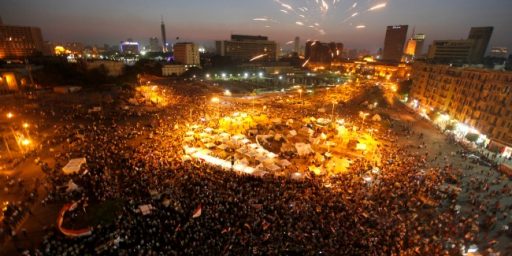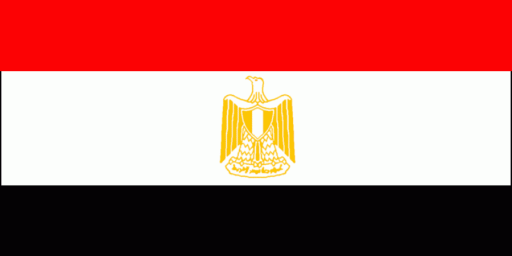Egypt Death Toll Hits 525
The death toll in Egypt has reached 525, and is likely to climb higher:
CAIRO — The death toll from Egypt’s bloody crackdown on supporters of the deposed president, Mohamed Morsi, soared beyond 500 across the land on Thursday with more than 3,700 people injured, the Health Ministry said, in a further sign of the extent and the ferocity of Wednesday’s scorched-earth assault by security forces to raze two pro-Morsi protest camps in Cairo.
Despite the growing tally of dead, however, Muslim Brotherhood supporters of Mr. Morsi urged followers to take to the streets on Thursday, a day after the assault on the camps set off a violent backlash across Egypt and underscored the new government’s determination to crush the Islamists who dominated the free elections over the past two years.
Mohamad Fathallah, the Health Ministry spokesman, told the official Al Ahram Web site that the toll so far stood at 525 with 3,717 injured. He said the biggest concentration of killings, numbering 202, had been in the larger of the two protest camps in Nasr City suburb, with 87 recorded in the smaller Nahda Square camp near Cairo University. A further 29 deaths were reported from the Helwan area on the outskirts of Cairo with 207 from other areas around the country.
The call for renewed demonstrations — threatening further violent confrontation on the streets — came as an overnight curfew, ignored by some pro-Morsi figures who gathered at a mosque and other places, drew to a close and gave way to a brittle, muted calm in the city.
“We will always be nonviolent and peaceful. We remain strong, defiant and resolved,” Gehad El-Haddad, a spokesman for the Muslim Brotherhood, wrote in a message on Twitter. “We will push forward until we bring down this military coup,” he said, referring to the ouster of Mr. Morsi six weeks ago.
The attack on Wednesday, the third mass killing of Islamist demonstrators since the overthrow, followed a series of government threats. But the scale — lasting more than 12 hours, with armored vehicles, bulldozers, tear gas, birdshot, live ammunition and snipers — and the ferocity far exceeded the Interior Ministry’s promises of a gradual and measured dispersal.
The violence spread to other cities, and Adli Mansour, the figurehead president appointed by Gen. Abdul-Fattah el-Sisi, declared a state of emergency, removing any limits on police action and returning Egypt to the state of virtual martial law that prevailed for three decades under President Hosni Mubarak. The government imposed a 7 p.m. curfew in most of the country, closed the banks and shut down all north-south train service.
On the streets Thursday morning, the authorities continued to tamp down fires and clean up the debris of the razed protest camps. The city was quieter than usual, witnesses said, as some residents had their first glimpse of the damage.
The Interior Ministry said that 43 security personnel died, news reports said, and there were indications that the tally was still mounting.
At one landmark mosque, relatives stood over the bodies of up to 240 dead, shrouded in white and laid out in neat rows. The ice keeping the bodies chilled was melting as household fans played over the makeshift morgue. Many of the bodies seemed to be badly burned. One man slumped against a pillar, his face contorted in grief. By Muslim tradition, the deceased are usually buried within 24 hours of dying.
On Wednesday, at least one protester was incinerated in his tent. Many others were shot in the head or chest, including some who appeared to be in their early teens, including the 17-year-old daughter of a prominent Islamist leader, Mohamed el-Beltagy. At a temporary morgue in one field hospital on Wednesday morning, the number of bodies grew to 12 from 3 in the space of 15 minutes.
“Martyrs, this way,” a medic called out to direct the men bringing new stretchers; the hems of women’s abayas were stained from the pools of blood covering the floor.
It’s difficult to see how Egypt will be able to step back over the line that was crossed yesterday. Indeed, we may be looking at something resembling civil war in the Arab world’s most populous nation. If that happens, all bets for the region are off.

![Military Coup Underway In Egypt [Update: Morsi Deposed]](https://otb.cachefly.net/wp-content/uploads/2011/02/egypt-flag3-512x256.gif)



IMO much depends on the Muslim Brotherhood’s next move. As I see it there are several. They could stand down at which point they become irrelevant. They could continue as they have, largely peacefully (although there are Coptic Christians who would undoubtedly dispute that), and court further reprisals from the military government. They could begin open forceful confrontation with the military. They could initiate covert but forceful engagement with the military.
At this point my guess is that they will begin a covert campaign against the government, becoming open where and when they’re strong enough, somewhat along the lines of what happened in Iraq in 2005-2007.
If the MB does not confront the government, it will become irrelevent, and then the mantle of opposition will be taken over by more radical elements, like what happened in Algeria. This is an opening for the AQ types to move into the vacuum created by such a scenario. It will be test of the MB leadership to walk the delicate line between the two scenarios.
With these actions, the military Government has lost whatever legitimacy it had, both with the Egyptian people and the rest of the world. I suspect that if there is a civil war, it would be somewhat one-sided.in terms of numbers of people although in firepower, it would be just the opposite.
One thing to remember is that the military in Egypt (like the Revolutionary Guards in Iran) are deeply integrated into the economy. Not only would they have to be ousted politically but economically. Which is a harder job.
The president needs to do more. No one seems to be paying attention at all to his statements of outrage at this senseless violence.
1- Demand a ceasefire and that both sides clear the streets. .
2- Send Sec. Kerry and Hagel over there to assess the situation and give whatever help that the US can.
3- Send Bill Clinton, Bush, or Carter over to sit down with both sides, arrange some sort of peace agreement and work out these problems.
4- Where is the UN? Why have they not stepped in to do something?
Enough of the talk.